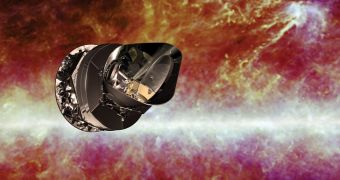The Planck space telescope is living its final moments. After several years of surveys, it was launched in 2009, the telescope has run out of coolant for its instruments and will now be put on a heliocentric orbit that will take it well away from the Earth and the Moon.
Unlike some satellites and telescopes that orbit closer to Earth, Planck won't be burned up in the atmosphere, making it possible for future collectors or museums to possibly retrieve it or maybe even take trips to it.
For now though, Planck's mission is over. The European Space Agency team running it emptied out its fuel tanks and will issue the shutdown command on October 23. The telescope hasn't been scientifically operational since October 3.
Planck was launched to survey the entire sky in microwave radiation. Data from it produced the most accurate map of the cosmic microwave background radiation (CMBR) the earliest remnant light in the universe, the first light that survived after the universe became transparent.

 14 DAY TRIAL //
14 DAY TRIAL //